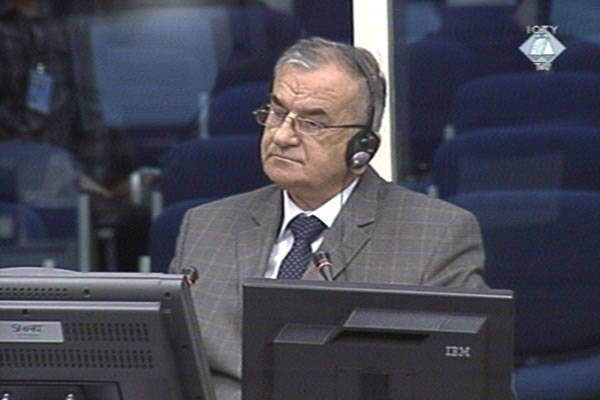Home
IT SEEMED IMPOSSIBLE BUT TURNED OUT TO BE POSSIBLE
The second highest ranked officer in the intelligence service of the Bosnian Serb army, Petar Salapura, repeated at the trial of Radovan Karadzic that he had not been informed about the Srebrenica massacre. As he said, the officers in the Main Staff ‘kept mum’ about it in front of him, because they had been ‘outraged’ by the number of victims. Indeed, when he did learn about the crime, he thought that such a crime was ‘impossible’ although it turned out to be possible after all
 Petar Salapura, defence witness of Radovan Karadzic
Petar Salapura, defence witness of Radovan Karadzic Colonel Petar Salapura completed his evidence in the defense of Radovan Karadzic today. Last week, he testified as a prosecution witness at the trial of Ratko Mladic. His evidence at both trials indicates that many soldiers, police officers and citizens in Republika Srpska knew about the execution of Srebrenica Muslims in July 1995, but not the two accused and the witness. At the time when the crimes were committed, Karadzic was the supreme commander and Mladic the commander of the Bosnian Serb Army Main Staff. Salapura was the intelligence chief in the Main Staff. In his testimony, Salapura claimed that he didn’t know if Karadzic and Mladic had known about the crimes. Months later when he learned about the events, Salapura didn’t inform them because by then, it was ‘general knowledge’.
When Srebrenica fell on 11 July 1995, the witness was in Banja Luka. The next day, he traveled to Belgrade via Bijeljina. There he met with an ‘agent’, whose name he wasn’t willing to disclose, and with the military attachés from the Japanese and Italian embassies. Salapura contends that they never said anything about the Srebrenica massacre. On 13 July 1995, Salapura went to Srebrenica to report to Mladic and his security chief Zdravko Tolimir about the talks in Belgrade. On that occasion, he saw a large number of detained Muslims. The fact didn’t disturb him because Salapura thought they would be treated as befitted prisoners of war.
After Srebrenica, Salapura went to the Main Staff in Han Pijesak where he stayed until 18 July 1995. Salapura contends that while he was there, he did not hear any reports about the execution of the people from Srebrenica. Salapura nevertheless harbors some suspicions that the highest-ranking Bosnian Serb military officers knew about the crime. The witness suspects that they ‘kept mum’ because they were ‘outraged’ over what they had learned or that perhaps they didn’t believe that the allegations about the number of victims were true. As Salapura told the court, he himself thought it was impossible, but, ‘as you can see, it turned out it was possible after all’.
The prosecutor recalled that after the Srebrenica operation, Salapura remained in touch with Miodrag Pelemis, the commander of the 10th Sabotage Detachment, whose members were involved in the executions. The witness claimed that initially Pelemis told him that the detachment had taken part in the fighting for the enclave. In December 1995, Salapura learned from the Drina Corps operations officer Lazic that the members of the detachment had participated in the mass executions. Salapura asked Pelemis if it was true. Pelemis confirmed it, explaining that only individuals were involved in the executions, not the entire unit. Salapura purportedly said that those who took part and ordered the executions should be held responsible.
The prosecutor noted that the witness took measures to ensure that the perpetrators could not be prosecuted when he asked the police minister Dragan Kijac on 16 January 1996 in writing to issue false identity papers to eight members of the 10th Sabotage Detachment. Most of them have been convicted or indicted for the crimes in Srebrenica. In a bid to explain why he had made this request, the witness said he wanted to save the lives of the eight men, so that they could be tried for the execution of Muslims in Branjevo. There was a real risk that the Bosnian intelligence service, AID, or the Serb commanders who had ordered them to commit the crime and who wanted to cover it up would want to ‘take the law in their own hands’.
In a brief re-examination, the witness said that he never submitted any reports to Karadzic, ‘either orally or in writing’, about the crime in Srebrenica. He learned about it ‘late’ and in his view he was not authorized to file any reports, Salapura explained.
In the second part of the hearing, a former member of the Zvornik Crisis Staff Cedomir Zelenovic began his testimony, to be continued tomorrow.Linked Reports
- Case : Karadzic
- 2013-06-21 KARADZIC AND MLADIC – AT LOGGERHEADS OR JOINING FORCES TO COMMIT CRIMES?
- 2013-06-20 KARADZIC THREATENS LAGUMDZIJA WITH SEVEN YEARS IN PRISON
- 2013-06-20 HOW KARADZIC WAS TRICKED
- 2013-06-25 ARKAN WAS ‘TO FORCE A PEACEFUL SOLUTION’
- 2013-06-26 RELATIONS BETWEEN KARADZIC AND MLADIC WERE ‘INTOLERABLE’
- 2013-06-27 ‘BEST OF THE BEST’ TESTIFIES IN KARADZIC’S DEFENSE
